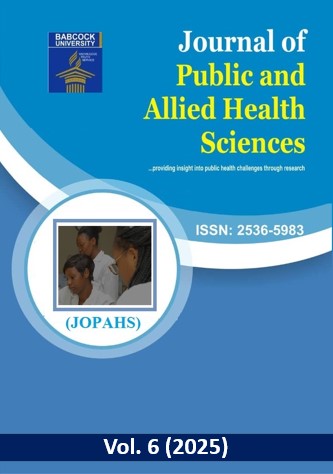In this issue of JPAHS, the editorial board has resolved to publish articles submitted to it for first online publication then collate all articles published online during the publication year into one print copy volume. This would facilitate more regular communication of research findings to readers, rather than wait for periodic print copies which delays communication of findings from studies conducted. We have featured in this second volume
of the print issue of articles in the special fields of public health microbiology and parasitology, environmental health, implications of contraceptive technology in health. However, the scope of JPAHS includes research in the special areas of public health science, health promotion, medical science and population social sciences. In the coming publications, JPAHS will be featuring studies from these areas.
JPAHS is a scholarly platform which provides researchers from a wide variety of fields in social and health sciences the opportunity to communicate findings emerging from their studies as explanations and insight into the dynamics of the problems they are researching. Research is a scientific activity engaged in by scholars with interest in exploring and providing explanations and solutions to the challenges the world is facing now. Research requires systematic approach of well-organized information and articulated thought process for unraveling the mysteries of the unknown. Therefore, when conceptualizing research, invest into it the rigour required to produce high quality results. We live in a time of profound changes in the way we understand our world and its environment, considering that much information have accumulated over the passing decades. Every study engaged by researchers produces valuable information that contributes to the universal body of knowledge. Empirical studies in science have played important role in unraveling the mysteries of the world and dispelling the fears of the unknown, particularly in the material world. In dispelling these fears of the unknown, there has been a simultaneous proliferation of new knowledge and a better understanding of the dynamics of life processes and a host of physical phenomena. The scientific methodological approach has influenced almost all facets of human endeavor. The major problem now is how to manage the output of science and some of
the unethical fallouts.
Empirical studies, to be of any benefit, must consider certain level of rigour introduced in its design and implementation. To gain the level of insight and proliferation of information science has achieved today into many mechanisms of cellular processes, cure for many diseases among others, researchers have applied creativity and rigour in conducting their studies. A researcher in setting out to conduct any study should settle the question of whether the design of the study can provide clear explanations of the dynamics of the problem being investigated. This can only be effectively achieved through theory-grounded research design without
which the study would merely be considered superficial and lacking in sufficient rigour. Second to this is the issue of ethical concerns being raised regarding study designs utilizing human and animal subjects. In this regard, the primary concern of the investigator should be the safety of the research subjects. This is accomplished by carefully considering the risk/benefit ratio and continually monitoring the research as it proceeds.
Published by School of Public and Allied Health Babcock University, Ilishan
Remo, Ogun State, Nigeria. www.babcock.edu.ng
Volume: 2
Providing Insight into Public Health Challenges through research
Journal Issues
The LATEST

All Articles in 2
Awareness and Access to Long Lasting Insecticides Treated Nets among Pregnant Women in Ogun State, Nigeria
Ololade Ogunsanmi, Arit Essang, Titilayo Olaoye, T Akere,
KeyWords: Malaria, Pregnant women, LLITN, Awareness, Transmission
Details- 59
- -
- 66
Effect of Hormonal Contraceptives on selected Biochemical Indices of Liver function in Women receiving Oral and Injectable Contraceptives in Isolo, Lagos State, Nigeria
Esther Adejumo, Issac O Adediji, Lydia B Obasi,
KeyWords: Liver function, Combined oral contraceptives, Progestin-only injectable contraceptives, Aspartate aminotransferase, Alanine aminotransferase, Alkaline phosphatase.
Details- 67
- -
- 72
Knowledge and Perceived risk of Sexually Transmitted Diseases among Babcock University Students, Ilisan- Remo, Ogun State, Nigeria
Titilayo Olaoye, Oghogho Oboreh, Saratu Ajike,
KeyWords: Awareness, Sexually Transmitted Diseases, Young Adult, Undergraduates, Sexually active
Details- 73
- -
- 81
Gram negative bacteria in tilapia fish (Tilapia zillii) and their antibacterial responses to phytochemical agents
KeyWords: Gram negative bacteria, antibiotics, spice extract, susceptibility
Details- 83
- -
- 89
Parasitic Contamination of Some Fresh Vegetables in a Local Community of Ilishan Remo, Ogun State, Nigeria
Faith Ugochi Nwadike, Olufemi Moses Agbolade, Oyetunde Timothy Oyeyemi,
KeyWords: Parasitic infections, vegetables, contamination, personal hygiene.
Details- 91
- -
- 97
